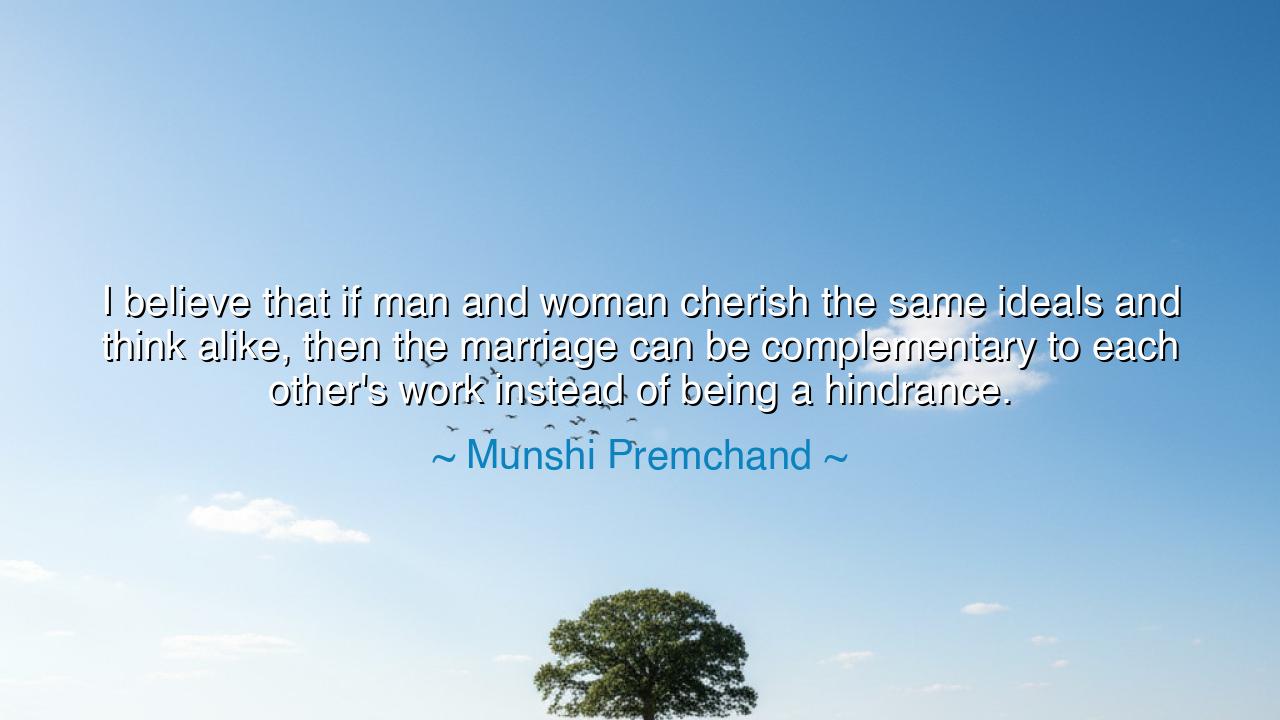
I believe that if man and woman cherish the same ideals and think
I believe that if man and woman cherish the same ideals and think alike, then the marriage can be complementary to each other's work instead of being a hindrance.






In the ancient heart of human wisdom, where the bonds of love and union are woven through the very fabric of society, there is a profound truth spoken by Munshi Premchand, a revered figure of the literary world: "I believe that if man and woman cherish the same ideals and think alike, then the marriage can be complementary to each other's work instead of being a hindrance." These words, echoing through the corridors of time, speak not just to the practical aspects of marriage but to the spiritual and emotional partnership that should be the foundation of a lasting union. Premchand reminds us that when man and woman share a common vision—one grounded in mutual respect, understanding, and a shared purpose—they can transcend the mundane struggles of daily life and instead become powerful allies in the pursuit of each other’s dreams.
In the ancient world, the concept of partnership was central to the wisdom of society. The Greeks, who believed in the importance of harmony and balance in all things, understood that true love between a man and a woman was not about domination or submission, but about complementary strengths. The great philosopher Plato spoke of the ideal of soulmates, where two individuals, through their bond, complete one another, not by being identical, but by recognizing each other’s strengths and weaknesses, and using that recognition to support and uplift one another. In this ideal, a marriage is not a static institution, but a dynamic partnership—one that is rooted in shared ideals and a mutual mission.
Consider the ancient tale of Antony and Cleopatra, whose relationship, though marked by power and political ambition, was also defined by their shared vision and complementary strengths. Cleopatra, the queen of Egypt, and Mark Antony, the Roman general, were two figures who, despite their conflicting allegiances and the political tensions of their time, found in each other a shared purpose—the expansion and preservation of their kingdoms. They complemented each other’s abilities, with Cleopatra’s wisdom and political insight blending with Antony’s military prowess. Their union, although tragic in its final outcome, offers a testament to how shared ideals and mutual respect can create a powerful and dynamic partnership, even amidst the pressures of political and personal challenges.
In Premchand’s vision of marriage, we see this same idea of complementary union. He suggests that when a man and a woman think alike, their marriage can become a force that enhances their individual work. This is not just about being together, but about actively contributing to each other’s growth and success. In the modern context, we see countless couples who have turned their shared passion into powerful collaborations—whether it be in the arts, business, or social activism. Frida Kahlo and Diego Rivera, for instance, both celebrated artists, shared not only a personal relationship but a shared commitment to the artistic world and to the political movements of their time. Their marriage was not just about love—it was about working together toward a shared vision, where each supported the other’s creative endeavors, even in the face of hardship.
The wisdom of Premchand speaks to the idea that a marriage is most successful when both partners work toward a common goal. It is not about the dominance of one over the other but about balance—where each partner’s strengths and weaknesses are embraced and used to support the other’s journey. This truth, though simple, is often overlooked in modern times, where marriage is sometimes seen as an individual contract rather than a shared partnership. Too often, marriages falter when one partner’s dreams and ambitions are stifled or ignored. When a couple’s ideals align, however, they create a powerful synergy—a force that propels both individuals forward, helping them to achieve their highest potential.
In today’s world, we must strive to embody Premchand’s vision of marriage—not as a static institution that binds us in routine but as a dynamic partnership that fosters growth, creativity, and support. We must seek partners who not only share our ideals but who complement our strengths and challenge our weaknesses. A successful marriage is not simply about sharing a life together, but about building that life together, creating something greater than the sum of its parts.
Thus, the lesson we must take from Premchand’s wisdom is clear: true marriage is a collaboration—a union of minds, hearts, and purposes. It is about empowering each other to be our best selves, and to work together toward a vision that benefits not only the couple but the world around them. Whether in personal relationships or in the greater society, the most transformative partnerships are those built on shared ideals, mutual respect, and a commitment to growth. Let us strive to cultivate marriages and relationships that are not just about survival but about the thriving of both individuals, united in purpose and love.






AAdministratorAdministrator
Welcome, honored guests. Please leave a comment, we will respond soon